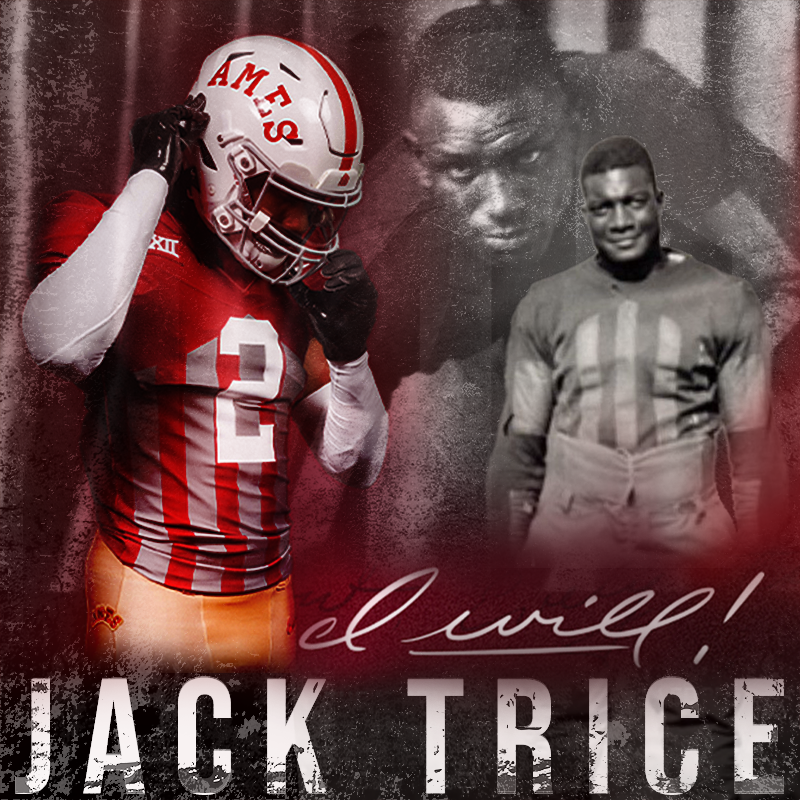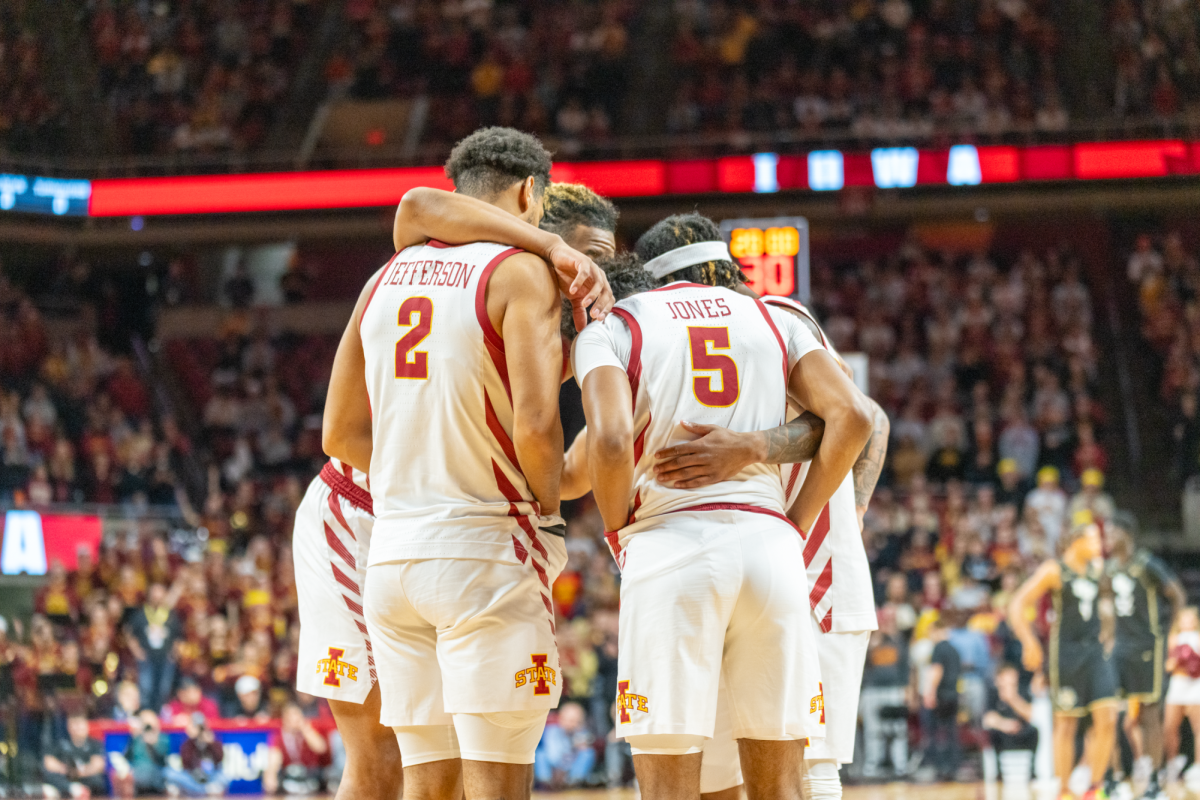AMES — One hundred years later, Jack Trice’s story and his life are still inspirational, relevant and what makes Iowa State the university it is and will always be.
Win or lose, Saturday’s football game against TCU will forever go down as a day to remember at Iowa State. The game falls one day before the 100th-year anniversary of Trice’s passing, and the Cyclone’s first African-American athlete’s legacy will be the focal point for not just the players and coaches, but those who have gotten to know who he was as a person.
For a long time after his passing, Trice’s story was seen for what it was. His trampling on the field in Minneapolis was a display of early 20th-century racism and one that surely will never be forgotten.
But diving deeper into his story and the impact he still has today, Trice is much more than a tragic passing and a story for Iowa State athletics.
Beyond the gridiron
Toyia Younger, who is chair of the Jack Trice commemoration committee and holds a Ph.D. in education policy and leadership, has made it her and her team’s goal to make sure after Saturday’s game people remember Trice as much more than just a football player. During her time on the committee for the last year and a half, she has worked with the Iowa State Athletic Department and the Trice family on ways to spread the story more broadly.
In Younger’s eyes, the committee’s hard work in doing so kicked off in November of last year with the ‘Breaking Barriers’ statue that stands outside the Stark Performance Center.
“That truly described what he did he truly paved the way for others,” Younger said. “Particularly black students and athletes at Iowa State. I would take it a step further and for black staff and faculty, he really helped integrate this university when at a time other universities weren’t doing so.”
George Trice, a cousin of Jack, serves on the committee and is president of the Trice Legacy Foundation, and is someone Younger and the rest of the committee wanted to hear from first when putting together commemorative events and landmarks.
What Younger found she learned the most about Jack Trice through her research was the humanization of such a historic figure. From learning about his young marriage, the fraternity he was a part of and how he came to Iowa State wanting to study cows, Younger believed that this was a crucial part of doing justice for him as they planned things out.
“What I’ve learned and appreciated is who Jack was,” Younger said. “While we always emphasize the football piece of it I think it’s just important for people to understand that he was a regular student like other folks. It was a unique time in American history because at that time most universities were not desegregated.”
Younger feels a sort of connection and appreciation for what Trice did for Black people in so many ways other than football. She believes that the impact of this story has gotten her where she is today and that 100 years ago a Black woman in this position was unthinkable.
“I feel as though I stand on the shoulders of Jack Trice as well,” Younger said. “I feel a connection to his story as a black woman in the United States and a black woman here at Iowa State.”
The committee also worked with the Trice Legacy Foundation in setting up a lecture that was held at Parks Library on Thursday which talked about his legacy and the impact that his story still holds today.
But perhaps the most meaningful event the committee has worked to set up is a ceremony held at noon Sunday on central campus that will serve as the 100th anniversary of Jack Trice’s funeral.
“People kind of describe it as a moment in time where the entire university came together to mourn the loss of this man,” Younger said. “We want to replicate that and do it again.”
The public is invited to the ceremony which will also host members of the Trice family, which Younger said 100 years ago members of his family were late to the ceremony. President of Iowa State University Wendy Wintersteen will also read the famous letter found by the Trice family, just like the university president did a century ago.
His impact on the players
Just as much as Trice has made an impact on those off the football field, current players on the team have also taken a lot away from his story and its message.
Sixth-year linebacker Gerry Vaughn was named the 2023 Jack Trice Endowed Scholarship recipient. The scholarship was first given to safety Anthony Johnson Jr. who received it in 2021 and 2022, before Vaughn received it in August.

“It’s truly an honor and I just thank my teammates, my family and my coaches for putting me in this position,” Vaughn said. “What he stood for and everything he did at this university, it’s an honor.”
Junior wide receiver Jaylin Noel admitted that he was not aware of the story before being recruited by Iowa State, but learned more about it before his commitment. He, like many other players, is honored to have the opportunity to play in this game and for a university that cares so deeply about what Trice stood for.
“Being able to play in this game means a lot and it will definitely be a significant game for everyone to play in and one that we won’t forget,” Noel said. “Me being an African-American and just knowing his story, it’s an honor to play for a program that cares for his name so much and carries on the tradition and what he stood for.”
Sophomore defensive back Jeremiah Cooper added to Noel’s comments about playing in the game, the significance of his story to Iowa State and the opportunity to play in such a historic game.
“It’s a crazy story, the character Jack Trice had and what he did for everyone currently and back then it’s something special,” Cooper said. “To be able to play in that game, in those uniforms for him, it’s a once-in-a-lifetime experience and I couldn’t be any more grateful.”
Along with dawning the throwback uniforms, MidAmerican Energy Field will display the throwback logo at midfield.

But head coach Matt Campbell, along with Younger, believes in honoring the man and not just the uniform. While what the football team and athletics are doing is unique, the message behind the uniforms is what’s most important to Campbell.
“You can look at this and you can see the uniforms and you can see guys getting T-shirts or you can reality in what we’re honoring,” Campbell said. “What you’re honoring is this man and the act of courage that he truly had 100 years ago, if you think about where we are today as a society, and having the courage to come and break the color barrier here at Iowa State in athletics it’s powerful.”
Trice’s legacy today and embracing it
Over the course of the last year and especially the last few months, Trice’s legacy has been talked about because of the uniforms and the centennial anniversary, but many believe that should not be the case.
While society has undoubtedly progressed since 1923, Trice’s story and the meaning behind it are still relevant today in many ways. Not solely as a story of race but one that encourages others to be a symbol of their beliefs.
Steve Jones, the author of the book “Football’s Fallen Hero: The Jack Trice Story”, talked about the importance that Trice’s story still holds today and what everyone can learn from it.
“His legacy is still, I think, as relevant today as it was a 1923,” Jones said. “Society hasn’t changed that much. And we need to still follow Jack’s leadership and, try to work hard, and I think that’s still important today.”
What Jones has found through his years of traveling and telling Trice’s story is that the farther he gets away from Ames, the fewer people know it. He believes that with how relevant it still is today, this weekend can’t just be a period of remembrance but a reminder to keep spreading the message and the inspirational value his story holds.
“The Jack Trice story is very inspirational and I think to a lot of people they’re inspired to do their best when they hear that he dedicated himself and his play to his self, family and race,” Jones said. “So it’s important to keep telling the Jack Trice story, and it’s important to get more and more people telling that story, that story to people to inspire others.”
Younger believes that the Trice story is the Iowa State story in that it shows no matter what race or how old you are, you have the ability to be a symbol for the future. She hopes that at the end of the weekend, people will be inspired to make a change just as Trice wasn’t afraid to do so.
“I think it’s a powerful story of this young man who had such a significant impact at a young age,” Younger said. “I want it to be a story of how it doesn’t matter who you are and how young you are you can have a tremendous impact on what the future is. I hope that they learn more about the story and who he was, but also the charges they take upon themselves to make an impact.”
The Trice story is unique in the sense that its impact will stand the test of time and there are many ways to look at it. He took a chance on himself during a conservative time in the United States and left his mark as not just a pioneer for Iowa State athletics but the university as a whole.
Campbell sounded off his beliefs on the legacy game and how it is not an advertisement for the team or the university, but a reminder of what his story means and the relevance it will continue to have.
“It’s not a gimmick, it’s not a t-shirt or a uniform it’s trailblazing,” Campbell said. “It’s courage, it’s probably in a lot of ways what we’re today missing in our society of being willing to stand for something and be about something.”








